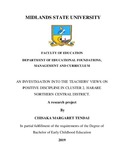Please use this identifier to cite or link to this item:
https://cris.library.msu.ac.zw//handle/11408/3744Full metadata record
| DC Field | Value | Language |
|---|---|---|
| dc.contributor.author | Chisaka, Margaret Tendai | - |
| dc.date.accessioned | 2019-10-16T11:05:53Z | - |
| dc.date.available | 2019-10-16T11:05:53Z | - |
| dc.date.issued | 2019 | - |
| dc.identifier.uri | http://hdl.handle.net/11408/3744 | - |
| dc.description.abstract | Positive discipline has become a global initiative in the educational sectors, particularly in early childhood education and primary and secondary education. In Zimbabwe, there has been a call by the Ministry of Education, imploring teachers to use positive discipline practices in the teaching and learning process. Teachers are expected and required to manage student behavior through the implementation of a well-designed classroom management plan. However, learners’ disruptions through undesirable and negative behavior require constant alteration of teachers’ management plan, reducing instructional time, and leaving teachers with frustration and stress. This study seeks to find out the Teacher’s views on positive discipline at Primary school level in cluster 2 Harare Northern District. The general purpose of the study is to find and bring out teachers general views, beliefs, values, practices and understanding on the use of positive discipline in primary school, and their overall knowledge of the use of positive discipline at primary school level. The study also aims to bring out the challenges faced by teachers in implementing positive discipline within the selected schools, highlighting solutions and strategies for implementing positive discipline at primary school level in order to make the use of positive discipline a success in the primary schools. The study will use the Qualitative - Case Study as a research design. Interviews will be used to collect data from teachers. The interviewer will be able to get face to face, first-hand information from the interviewees. The research participants will consist of 48 teachers who will be randomly selected from each of the 3 selected schools from cluster 2 Harare Northern Central District. A breakdown of 30 teachers for structured Interviews and 18 teachers for focus group discussion The study will help policy makers to craft a policy that is based on empirical evidence collected from the teachers who have first-hand experience and information on the use of positive discipline at primary school level. Teachers will receive the general support they need in order to be able to implement positive discipline practices with the correct amount of knowledge and the right techniques required to make the implementation of positive discipline a success. Learners will benefit from this study if teachers are able to use positive discipline practices in the classrooms, nurturing learners who are self-disciplined and free to develop in areas of their strengths. The study will also assist the University community in carrying out further studies in the related field with provision of literature. | en_US |
| dc.language.iso | en | en_US |
| dc.publisher | Midlands State University | en_US |
| dc.subject | Positive discipline | en_US |
| dc.subject | Early childhood education | en_US |
| dc.title | An investigation into the teachers’ views on positive discipline in cluster 2, Harare Northern central district. | en_US |
| item.grantfulltext | open | - |
| item.fulltext | With Fulltext | - |
| item.languageiso639-1 | en | - |
| Appears in Collections: | Bachelor of Education in Early Childhood Education | |
Files in This Item:
| File | Description | Size | Format | |
|---|---|---|---|---|
| CHISAKA.pdf | Full Text | 1.15 MB | Adobe PDF |  View/Open |
Page view(s)
252
checked on Dec 21, 2025
Download(s)
164
checked on Dec 21, 2025
Google ScholarTM
Check
Items in MSUIR are protected by copyright, with all rights reserved, unless otherwise indicated.



